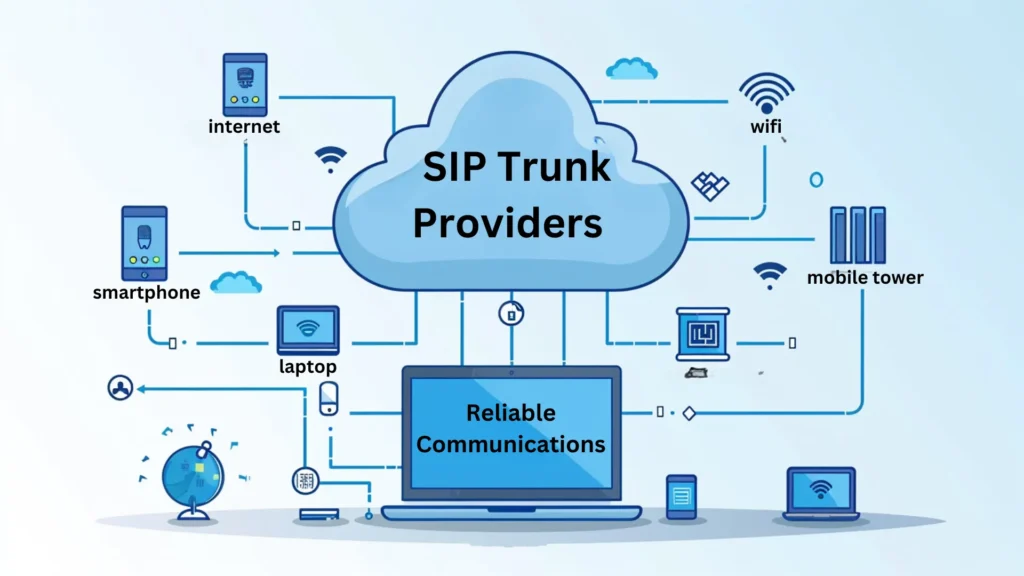In today’s digital world, businesses rely on Session Initiation Protocol (SIP) providers to power their VoIP communication systems. Choosing the right SIP provider is crucial for ensuring seamless connectivity, high-quality voice calls, and cost savings. With so many providers in the market, how do you pick the best one for your business needs? This guide will help you navigate the key factors to consider when selecting a SIP provider.

1. Call Quality and Reliability
The foundation of any VoIP system is clear, uninterrupted communication. When evaluating SIP providers, look for:
- Low latency and jitter to avoid call delays or distortion.
- High uptime guarantees (99.99% or better).
- Global network coverage to ensure smooth communication worldwide.
- Redundant data centers for added reliability and failover protection.
2. Pricing and Cost Transparency
SIP trunking can save businesses up to 50% compared to traditional phone lines. However, pricing structures vary among providers. Consider:
- Per-minute vs. unlimited calling plans based on your usage.
- Hidden fees for setup, maintenance, or extra features.
- Scalability options to adjust your plan as your business grows.
- Pay-as-you-go models to avoid unnecessary costs.
3. Security and Compliance
SIP services handle sensitive data, so security should be a top priority. Check for:
- Encryption protocols (TLS, SRTP) to protect voice traffic.
- Fraud prevention mechanisms like real-time monitoring and anomaly detection.
- Regulatory compliance (HIPAA, GDPR) for industries with strict data protection requirements.
- DDoS protection to prevent service disruptions.
4. Scalability and Flexibility
Your business needs may change over time. Choose a provider that offers:
- Easy scalability to add or remove SIP trunks as needed.
- Geographic flexibility for global office expansion.
- Cloud-based integrations with popular platforms like Microsoft Teams, Zoom, or CRM systems.
5. Customer Support and SLAs
Even the best SIP providers can encounter occasional issues. Ensure you have access to reliable customer support with:
- 24/7 technical support via phone, chat, or email.
- Service Level Agreements (SLAs) guaranteeing response times and uptime.
- A dedicated account manager for personalized assistance.
6. Interoperability and Compatibility
Your SIP provider should seamlessly integrate with your existing infrastructure, including:
- PBX systems (Asterisk, FreePBX, Cisco, Avaya, etc.).
- Softphones and hardware phones from multiple vendors.
- Unified Communications (UCaaS) platforms for video, chat, and collaboration.
7. Trial and Testing Options
Before committing, ask about:
- Free trials or demo accounts to test call quality.
- Porting assistance for transferring your existing numbers smoothly.
- Pilot programs for large businesses to evaluate the service on a smaller scale.
Final Thoughts
Choosing the right SIP provider can make a huge difference in communication quality, costs, and overall business efficiency. By considering factors such as reliability, pricing, security, scalability, customer support, and interoperability, you can find a provider that aligns with your business needs.
Before making a decision, test their services through free trials or demos to ensure a seamless transition. A well-chosen SIP provider will help your business stay connected, reduce costs, and enhance productivity.
Read More: https://wealthfitlife.com/how-to-start-an-sip-systematic-investment-plan-in-2025/
Frequently asked questions (FAQs)
1. What is a SIP provider?
A SIP provider is a company that offers SIP trunking services, enabling businesses to make and receive calls over the internet instead of traditional phone lines.
2. How do I know if my business needs a SIP provider?
If your business relies on VoIP communication, PBX systems, or needs a cost-effective alternative to traditional phone lines, a SIP provider can improve call quality and reduce costs.
3. What are the key benefits of using a SIP provider?
- Lower call costs compared to traditional phone lines
- Scalability to add or remove lines easily
- Flexibility to make calls from anywhere
- Enhanced security with encryption and fraud protection
4. How do I compare SIP providers?
Look for factors like call quality, uptime guarantees, pricing transparency, security features, customer support, and integrations with your existing systems.
5. What is SIP trunking, and how does it work?
SIP trunking replaces traditional phone lines by using the internet to connect your PBX (Private Branch Exchange) to the Public Switched Telephone Network (PSTN), enabling seamless VoIP calling.
6. Can I keep my existing phone numbers when switching to a SIP provider?
Yes, most SIP providers offer number porting, allowing you to keep your current business numbers while transitioning to SIP-based communication.
7. How much does SIP trunking cost?
Costs vary depending on factors like per-minute rates, unlimited plans, setup fees, and additional services. Many providers offer flexible pricing based on your call volume.
8. How secure is SIP trunking?
Reputable SIP providers use encryption (TLS, SRTP), fraud detection, DDoS protection, and compliance measures (HIPAA, GDPR) to ensure secure communication.
9. What happens if my internet goes down?
Good SIP providers offer failover options, such as routing calls to mobile devices or backup lines, ensuring business continuity even during internet outages.
10. Can SIP providers integrate with my existing systems?
Yes! Most SIP providers support PBX systems (Asterisk, FreePBX, Cisco, Avaya), softphones, and UCaaS platforms like Microsoft Teams and Zoom for seamless connectivity.
